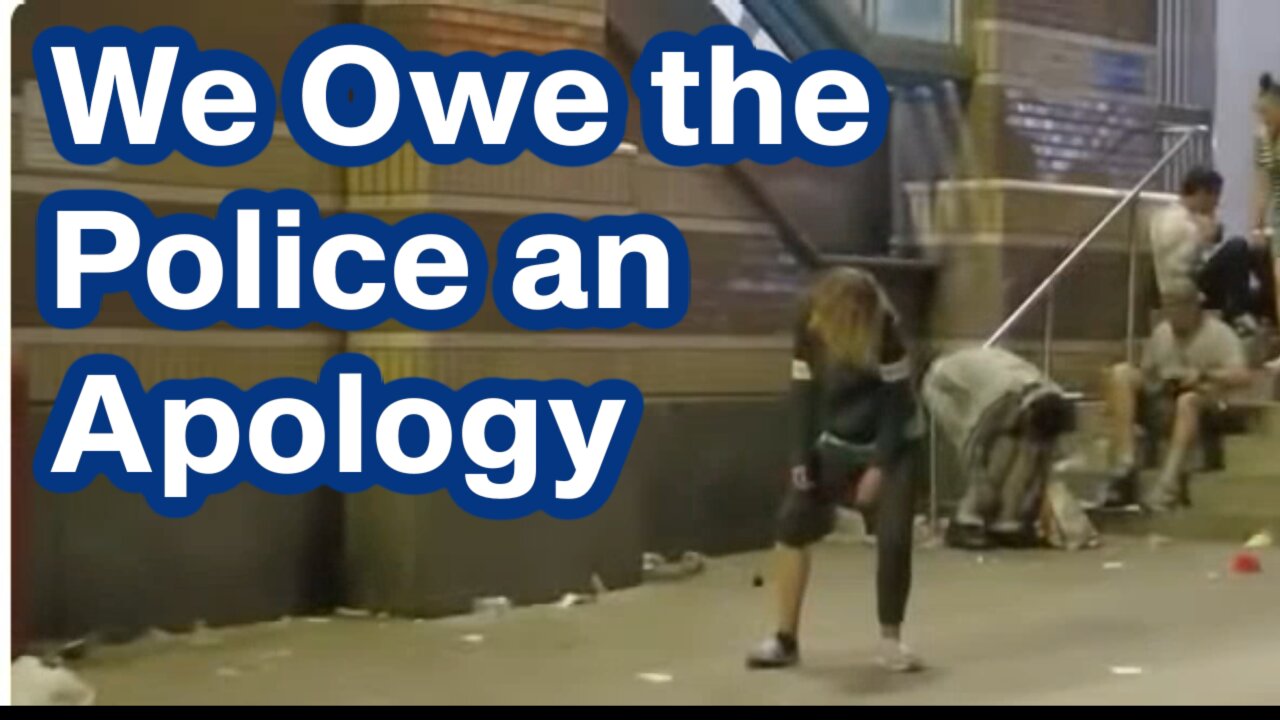Premium Only Content

We Owe the Police an Apology
The title of this video might sound a bit dramatic, but it reflects a stark reality. The landscape of policing is undergoing a seismic shift, and it's not looking likely to revert to its former state anytime soon.
Let's start with the numbers. Record numbers of police officers are leaving the force, and recruitment rates have hit rock bottom. Why? Well, it's a complex issue with multifaceted reasons. One significant factor is the evolving perception of law enforcement.
The qualifications and employment restrictions for police roles are getting tighter, and stricter. While it's essential to ensure the highest standards within law enforcement, there's a growing concern that these expectations might not align with the intense scrutiny and inherent dangers officers face daily. Moreover, we are requiring officers to meet more qualifications than any other professional field out there, and for their reward, modern police are paid less, treated harsher, forced to work worse schedules, and pushed into the pressure cooker of danger and drama that we the public are creating. The police are answering calls for you. They are responding to your issues, your needs, and your crimes. Somehow, we hate them for it.
Imagine this: one mistake, one misjudgment, and a career built over years of service could be shattered by a single event. Now add the financial danger as well as the possibility of prosecution and how can we expect the police to act? The fear of being ruined by a momentary lapse is a real concern among those in law enforcement.
Moreover, the job itself has become increasingly challenging. The demands on police officers have surged, spanning far beyond traditional law enforcement duties. They're expected to navigate complex social issues, mental health crises, and more, often without adequate support systems in place.
And let's talk about the dangers. Policing has always been a high-risk job. But now, with heightened public scrutiny, increased dangers, and limited resources, the risks have amplified. Not t0 mention, somehow, it has become popular to antagonize the police, to force conflict, and to question everything they do and say. The climate has become more hostile, more unforgiving.
So, where does this leave us? Are we witnessing the end of traditional policing? Well, not necessarily. First and foremost it is time that we apologize to the police. For far too long, politicians and lawmakers have been using the police to divide people, communities, and neighborhoods. The media has leaped at every opportunity to portray the police in a negative light. Story after story has been embellished, over-reported, and left incomplete with the police looking like the bad guy. What they are not telling you about are the court cases that are bringing all of the evidence forth and ending in convictions of the criminals without vindication from the police. What we're seeing is a call for change—a demand for a more balanced, better-reviewed law enforcement system, where we see the good not just the bad.
It's time to address the issues and bridge the gap between stringent qualifications and the daily challenging realities officers face. Crime is absolutely out of control and yet we allow politicians and the media to make excuses and point the finger at everyone but themselves. We need to reevaluate the support systems, provide a clearer picture of the actions of the police, and the need for police action in response to crime, prioritize mental health resources, and rebuild trust between communities and law enforcement.
Change is inevitable, but it's crucial to ensure that it leads to a better, more effective, and compassionate system for law enforcement. Politicians cannot remain in office if they continue to write laws designed to target the citizens and generate revenue for the simple sake of generating revenue. The police are a vital part of our community and ensure that we are safe and assist in times of need. The police are usually the first to respond to every emergency and have boots on the ground. Politicians and the media come after the danger.
So, while the landscape might never revert to what it once was, it's within our power to shape a future where law enforcement is both effective and fair—a future where safety and justice prevail. Technology can help keep the police safe but it cannot be used to replace them or take the human element out of the incident. You cannot rely on politicians to do the right thing when they are not affected by it. They must be forced to do the will of the people or be voted out of office.
-
 LIVE
LIVE
Eternal_Spartan
5 hours agoLive at 9pm Central! Come Hang Out w/ a USMC Vet Playing HALO! Can't Wait to See Everyone!!
714 watching -
 5:09:12
5:09:12
EzekielMaxwellVT
8 hours agoVTuber/VRumbler - Vampire The Masquerade - Listening to the voices in Jo's head
11.7K -
 6:48:45
6:48:45
Welsh Girl
8 hours ago🔴 Minecraft - Finding the Ender Dragon - DAY 7
18.7K3 -
 4:00:33
4:00:33
SynthTrax & DJ Cheezus Livestreams
1 day agoFriday Night Synthwave 80s 90s Electronica and more DJ MIX Livestream Trip-Hop SPECIAL EDITION
55.7K1 -
 4:03:27
4:03:27
FusedAegisTV
11 hours agoRumble Smackdown! #001 Street Fighter 6 $500 Online Tournament
72.8K8 -
 55:58
55:58
BonginoReport
9 hours agoCan Trump Make TikTok Great Again? (Ep. 20) - Nightly Scroll with Hayley Caronia - 04/04/25
147K82 -

Jorba4
5 hours ago🔴Live-Jorba4- COD WARZONE- VERDANSK FRIDAY. Hot drops W/ XxXAztecWarrior and Lumpy Potato X2
28.9K -
 4:33:11
4:33:11
Nerdrotic
11 hours ago $33.38 earnedPost-Apocalyptic Woke Hollywood, MineCRAP, CinemaCONNED - Friday Night Tights 348, Chris Gore & Rags
125K19 -
 1:00:43
1:00:43
Sarah Westall
8 hours agoThe Greatest Financial Crime in History: How Globalist Central Bankers Did It w/ James Patrick
69.2K3 -
 4:44:07
4:44:07
IamTyrantt
7 hours ago $1.37 earnedTGIF! HIGH ENERGY VIBES!
37.4K1